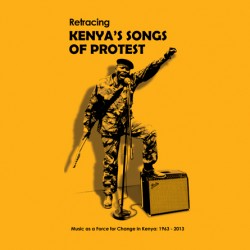SAUTI: gifted different unsilenced
‘SAUTI – Gifted Different Unsilenced’ is a multimedia project by Ketebul Music, comprising a short film in a feature documentary format, and a 5-song music compilation.
The documentary film highlights the stories of four musicians who due to certain peculiar circumstances in their lives are prone to facing discrimination, stigmatization and marginalization. These circumstances include various types of physical disabilities (including visual impairment), religious beliefs, sexual orientation, sexual identity, gender, ethnicity, and geopolitical reasons.
The documentary is accompanied by 5 original songs by the featured artistes recorded and produced by Ketebul Music as soundtracks for the film .
As the title suggests, these gifted musicians are perceived as being “different” owing to the traits outlined above. However, they choose not to be relegated to silence, but rather use their voices and music as tools to transcend prejudice and stereotypical norms.
Featured Artistes
Awilo Mike
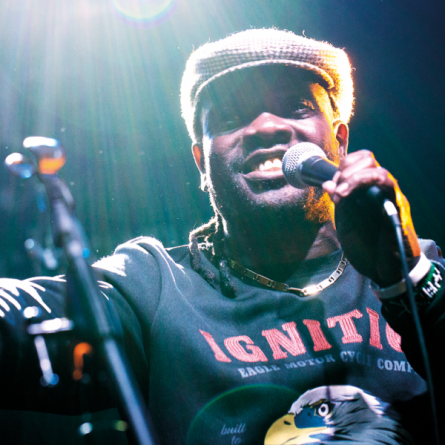
Awilo Mike performing at the SAUTI documentary screening
Born Mike Otieno Ooko and hailing from Busia, Awilo was infected by polio at a young age leading to crippling of his right leg. He was nicknamed “Awilo”, after the Congolese music star Awilo Longomba, due to his way of dressing and ability to sing in Lingala.
Awilo is a founding member of the renowned Ja’mnazi Africa band formed in 2002. Credited as one of the groups that have changed the face of the local music industry, Ja’mnazi are based in Eldoret and comprises of 25 musicians. Their most memorable classics include ‘Am Not Sober’, ‘Kendu Bay’ and ‘Riziki’, sang in their characteristic benga-rumba fusion. They are winners of several regional awards and remain darlings of local audiences, especially those fond of live music performances.
Gargar
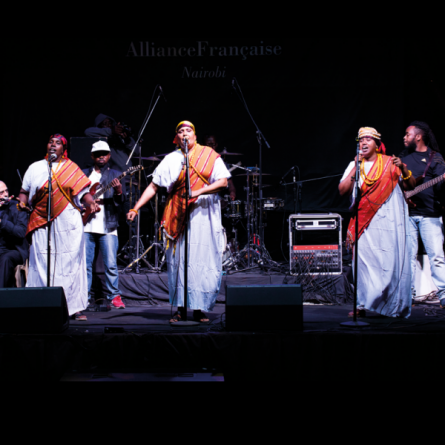
Gargar performing on stage at the SAUTI screening at Alliance Française de Nairobi
Gargar comprises of Kenyan women of Somali origin based in Garissa, North-Eastern Kenya. Although the group currently has 3 members, they are part of a larger women’s self empowerment group formed in 2003, with the purpose of reminding people of their traditional culture, and empowering women in the Somali community through music, crafts and other economic activities.
Gargar came to the limelight in 2008, as one of the 11 finalists in the Spotlight on Kenyan Music programme. Their AIDS awareness song titled ‘Aids Wadila’ (Aids Kills) was released in the same year. Since then, the ladies have traveled and toured the world enthralling audiences from all walks of life.
Being women of Somali ethnicity who practice Islam and live in Garissa, Gargar are prone to facing discrimination and marginalization by reason of their gender, culture, religious beliefs and geopolitical location.
Kamanu M’tuamwari
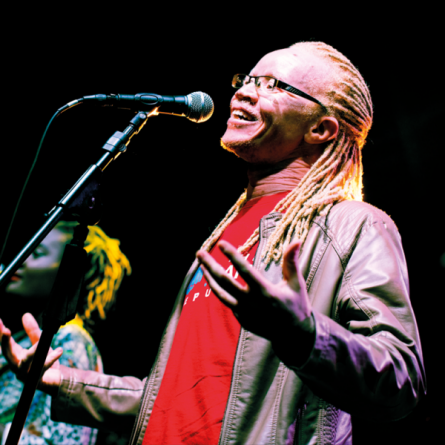
Kamanu M’Tuamwari on stage during SAUTI documentary screening
Born Imwari James and brought up in Meru County, Kamanu M’tuamwari is a household name in his community and beyond. He started singing and experimenting with homemade instruments as a young boy, but got his first chance to perform to a live audience and with a band as a student at Kenyatta University in 2002. When his career took off, he got his stage name from the traditional Ameru dance – Kamanu, a fact that reflects his fine and unique blend of traditional Meru and pop sounds.
Kamanu is a multi-instrumentalist with an eclectic sound, drawn from his love for country music, folk, benga and rumba. To date, he has released 3 albums with the latest being Romba Mwathani (2018), a compilation album of 8 Ameru cultural songs.
Being the last born in a family of ten, six of whom are persons with albinism, Kamanu says he had no problem learning to live with albinism since the “coping mechanism” as he puts it, was laid out by his siblings before him.
Michel Ongaro
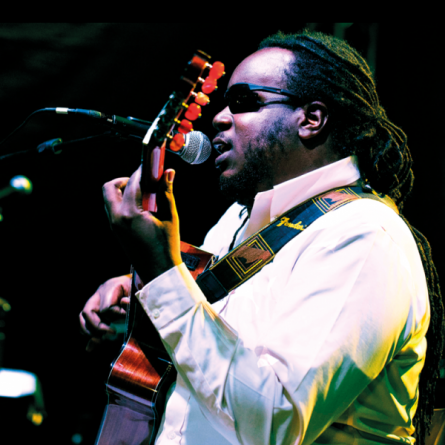
Michel Ongaro at the SAUTI documentary screening
Michel Ongaro discovered his talent for music at a tender age with makeshift percussion instruments that he’d make for himself from basins and buckets accompanied with improvised sounds produced from his own mouth. He has been active in the music professionally since 2002. Today he is a singer, songwriter, multi-instrumentalist and music coach based in Nairobi.
Although especially famous for his superb guitar skills, Michel also plays the flute, various percussion and drums. His music borrows largely from African cultural sounds blended with jazz and latin sounds to create a charming and unique blend.
Michel has released two albums: Sentalain (2007) and Mazoea (2012). He is a co founder of the Mambo Tribe band/project and he also plays with several established bands in Nairobi.
Michel lost both his eyes at a very young age due to retinobastoma.
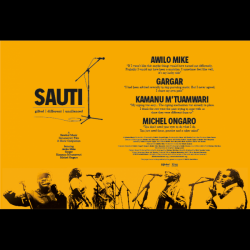
Shades of Benga – The Story of Popular Music in Kenya: 1946 – 2016
Shades of Benga: The Story of Popular Music in Kenya delves into the foundations of modern Kenyan music, examining external influences from the English waltz to Afro Cuban Rumba and how they helped mould new music styles across Africa. Rumba was brought to Eastern Africa via the itinerant Congolese musicians Edouard Masengo and Jean Bosco Mwenda who’s intricate guitar-picking styles largely shaped the present Kenyan sound, with the Benga playing a dominant role.
Although dozens of works have been published over the years on various characteristics of popular music in Kenya – from conventional folk to hip hop – none captures the history of music and its players as authoritatively as Shades of Benga: The Story of Popular Music in Kenya. An informed study of some literary publications and academic papers on music immediately reveals that the writers, who frequently tend to be foreign ‘experts’, do not seek the opinions of pioneer musicians who helped shape the various genres of music. Their research is largely based on information obtained from sources that are readily available on the Internet but often not easily verifiable. As we wrote this book, we made every possible effort to engage with practitioners directly involved in creating and shaping benga in order to ensure that their collective voice remains the sole critical factor to placing the music in its proper perspective while simultaneously giving the other genres in Kenya their correct definition. We undertook the arduous task of meticulously putting together the content that would faithfully recount the remarkable story of the development of our music in a manner previously not attempted.
In an effort to make this 678-page book an easy read as well as eye catching, Shades of Benga: The Story of Popular Music in Kenya features over 400 pictures.
#shadesofbenga
#legendarykenyans
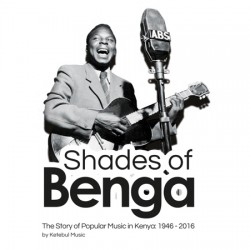
Retracing Kenya’s Songs of Protest
The pursuit of freedom the world over has always been complemented by music. Sometimes, the music has defined the cause, ignited the public’s demand for progressive change and crystallized the ideology of the movement for reform. At other times, the music has sharpened our understanding of the wrongs that need to be addressed; it has strengthened our resolve and sustained our anger and hope.
Sometimes musicians have paid a very high price for their criticism. D.O. Misiani who braved the attentions of not one but three Kenyan presidents is a good example.
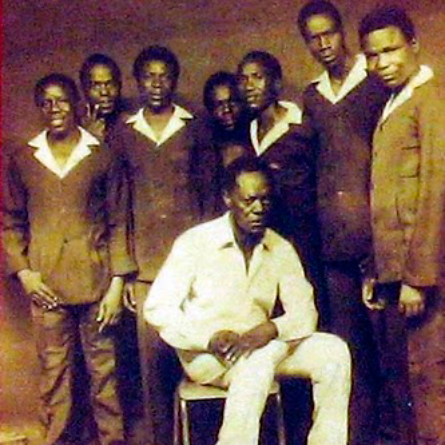
D. O. Misiani (seated) and Shirati Band.
In the 90s Eric Wainaina rubbed .the powers that be the wrong way with his anti-corruption song ‘Nchi ya Kitu Kidogo.’
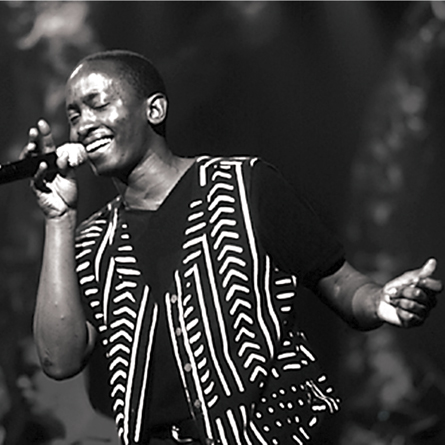
Eric Wainaina
Likewise, we will always associate the dramatic end of Daniel arap Moi’s 24-year rule in Kenya to sounds of ‘Yote Yawezekana.’ Indeed, the creative energy with which protesting marchers at Nairobi’s Uhuru Park changed the lyrics of ‘Yote Yawezekana’ from their original Christian message of hope in divine deliverance to one of political protest and economic reform shows music’s defining role in the struggle for freedom of expression.
And as the curtain came down on the Moi years, two young Kenyans by the stage name Gidigidi Majimaji provided the country with the soundtrack that reaffirmed the people’s collective will, sense of worth and their unshakeable desire for constitutional reform. The raw energy of ‘Unbwogable,’ its anger and defiance was captured by the mood, which sent Kenyans to the polls in December 2002.
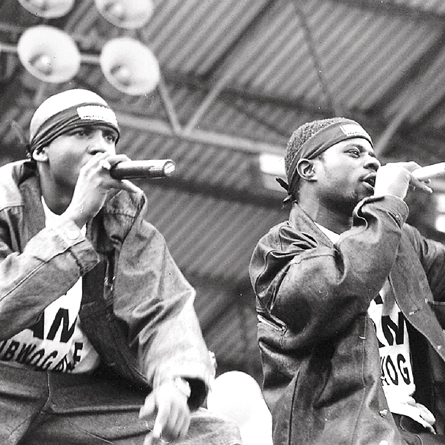
Gidigidi Majimaji performing 'Unbwogable' at the height of the multi party campaigns in 2002
This compilation celebrates this ‘protest’ music and those who make it: music that reflects the collective will to create a better order: music that plays a crucial part in bringing about social change and celebrates the visionaries whose sacrifice makes such change possible.
John Sibi-Okumu
